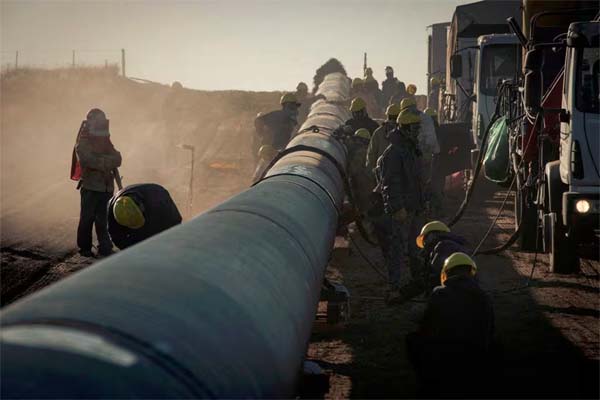
Eliana Raszewski/Reuters
BUENOS AIRES
EnergiesNet.com 11 15 2022
Argentina has a $12 billion energy conundrum: what to do about state subsidies that keep prices at a minimum for two-thirds of consumers, a popular measure that is straining state coffers and a deal with the International Monetary Fund (IMF).
Those subsidies, that keep energy bills at under 15% of normal, will play a key role in a run-off presidential election on Sunday between Economy Minister Sergio Massa and libertarian outsider Javier Milei, who wants to “chainsaw” state spending.
Milei has said he will cut all subsidies, but admitted it would have to be done slowly. Massa, meanwhile, claims he would keep energy bills down, though needs to trim state spending to meet a target he has set to erase a deep fiscal deficit.
It is a tricky balancing act.
On one hand inflation is headed towards 185% by the end of the year, the latest central bank poll estimated, which has left voters angry at constantly rising prices and dragged two-fifths of the population into poverty. Subsidies help ease the pain.
Argentina, however, has a deep fiscal deficit, negative net dollar reserves and is playing a risky game of whack-a-mole with its debts to the IMF, bondholders, and more recently China. It badly needs to cut spending to get its finances in order.
“It is a challenge for whoever wins to reverse this situation,” said Emilio Apud, ex-energy secretary and a former director of state oil firm YPF (YPFD.BA) , who added that the issue was a remnant of decades of costly state intervention.
He admitted hiking energy bills was tough medicine in a society already hurting, but argued it needed to be done.
“If you increase energy prices today, there is an inflationary peak and it’s over. If you don’t, inflation continues its upward curve without limit,” he said.
Economists and energy analysts generally agree that the country, which has the world’s second largest shale gas reserves and fourth for shale oil in the huge Vaca Muerta formation, needs to cut back subsidies that were near 2% of GDP last year.
Data from consulting firm Aleph Energy show they were $12.4 billion in 2022 and already over $8 billion up till September this year.
Daniel Dreizzen, director of Aleph and a former secretary of energy planning, said ironically the subsidies fanned inflation as they were often funded by the central bank printing money.
“All these subsidies – last year 1.9% of GDP – are financed with monetary emission. That ends up being paid in some way by the entire population via inflation,” said Dreizzen.

‘SUBSIDIES WON’T DISAPPEAR’
Energy prices have become central in the election campaign.
Peronist Massa has alleged that under Milei monthly electricity bills would skyrocket from around 5,000 pesos ($14 at the official exchange rate) to 15,000 pesos. He has said train and bus fares would rise even more sharply.
The left-leaning Peronists have a history of subsidizing energy costs, controversial amid years of economic crisis, debt defaults and failed programs with the IMF. Conservative leader Mauricio Macri (2015-19) cut energy subsidies back.
Currently higher-income residents pay about 80% of cost, making up around one-third of the total. The rest of the population pay 15% or 10% for the most vulnerable sectors.
Milei did not respond to a request for comment, but a source from his team denied subsidies would simply vanish.
“Subsidies won’t disappear, nor will rates be at levels that people cannot pay,” a source from Milei’s team told Reuters, asking not to be named. “What the state has to ensure is that the subsidy money is received by whoever really needs it.”
The third largest economy in Latin America is making a big bet on its shale region Vaca Muerta, hoping that by boosting production it can cut reliance on costly imports and even start exporting more to bring in dollars. A government-set lower local oil price does however dampen investment, energy firms said.
Both Massa and Milei have highlighted the potential of Vaca Muerta, with Massa pushing plans to boost production, add pipelines, and eventually liquefied natural gas (LNG) exports. Milei has spoken about privatizing parts of state firm YPF.
“No one doubts that Argentina can be a great energy exporter,” said Aleph’s Dreizzen, adding it could reach an energy trade surplus of $3.3 billion next year. “But the tariff angle is a sensitive issue in a country that has over 40% poverty.”
Raquel Ramírez, a 59-year-old manager of a confectionery shop in Buenos Aires, said she doubted Milei would get rid of the subsidies. She focused her on anger on inflation.
“I don’t think Milei will eliminate all subsidies,” she said, adding she would likely vote for him for a “change”.
“I just can’t vote for Massa. He has been minister for more than a year and prices are increasing every day. I can’t buy even a kilo of tomatoes and it’s hard to pay my insurance.”
Reporting by Eliana Raszewski; Editing by Adam Jourdan and Marguerita Choy
euters.com 11 15 2023







